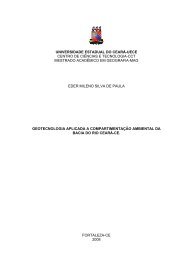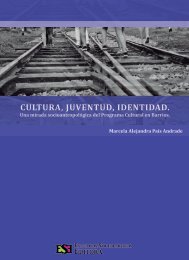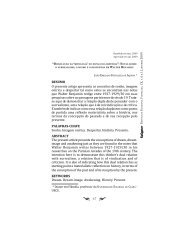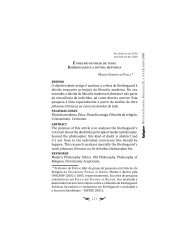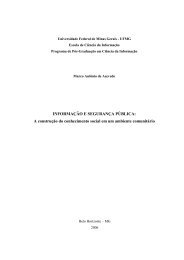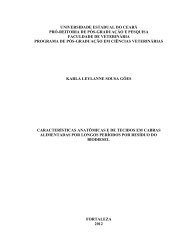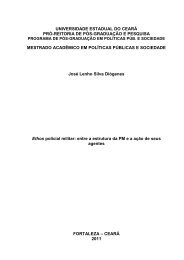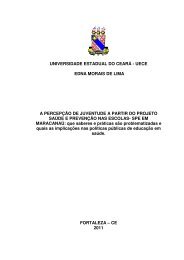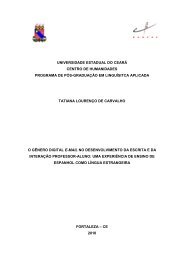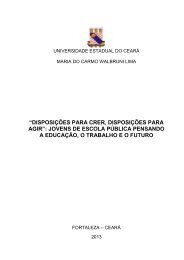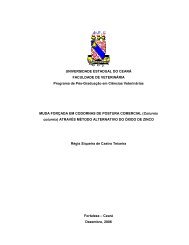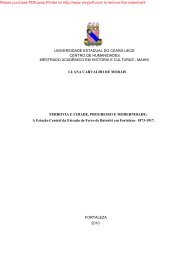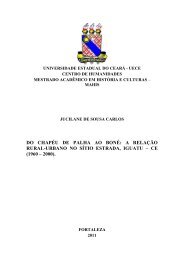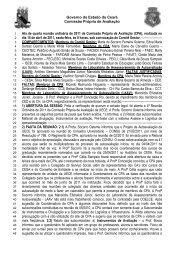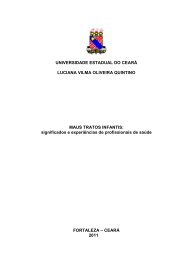Glenda Demes da Cruz - Universidade Estadual do Ceará
Glenda Demes da Cruz - Universidade Estadual do Ceará
Glenda Demes da Cruz - Universidade Estadual do Ceará
Create successful ePaper yourself
Turn your PDF publications into a flip-book with our unique Google optimized e-Paper software.
mensagem – quan<strong>do</strong> <strong>da</strong> minha entra<strong>da</strong> em um grupo de discussão –<br />
de uma forma muito generosa e extremamente inteligente. E, ali está<br />
a minha mensagem, no papel, mensagem essa que, quan<strong>do</strong> mandei,<br />
imaginei estar sen<strong>do</strong> li<strong>da</strong> on-line. Também imaginei que tal<br />
mensagem estivesse sen<strong>do</strong> li<strong>da</strong> rapi<strong>da</strong>mente, por uma audiência<br />
forma<strong>da</strong> de amigos e estranhos, que deveriam responder ao meu<br />
pedi<strong>do</strong> de aju<strong>da</strong> e informação. Agora encontro essas mesmas<br />
palavras impressas, sujeitas a uma análise acadêmica minuciosa. A<br />
internet é agora, claramente, um lugar público. È melhor observar o<br />
que digo / escrevo. 4<br />
Muitos pesquisa<strong>do</strong>res têm busca<strong>do</strong> soluções para tal questão.<br />
Temos hoje significativos estu<strong>do</strong>s (Bonini, 2000; Biasenbach-Lucas,<br />
Weasenforth, 2001; Crystal, 2001; Baron 1998, 2001; Danet, 2002, Assis,<br />
2002; Marcuschi, 2004; Paiva, 2004, entre outros) basea<strong>do</strong>s em corpora<br />
constantes de e-mails de um para um.<br />
Em tais estu<strong>do</strong>s, temos propostas de caracterização <strong>do</strong> e-mail<br />
como gênero (Marcuschi, 2004; Paiva, 2004) e como suporte (Marcuschi,<br />
2003), o que, aos poucos, parece situar o e-mail dentro <strong>do</strong> campo <strong>da</strong><br />
escrita ou como algo entre a fala por escrito e a escrita <strong>da</strong> fala.<br />
Se já se disse que o e-mail, apesar de ain<strong>da</strong> não<br />
completamente caracteriza<strong>do</strong>, gira em torno de elementos pertencentes à<br />
orali<strong>da</strong>de e à escrita, tanto formal como informal, que outros elementos<br />
poderiam caracterizar a linguagem <strong>do</strong> e-mail gênero? O que seria o<br />
suporte e-mail? Que mu<strong>da</strong>nças ocorreriam na escrita se um gênero<br />
pertencente ao suporte “papel”, por exemplo, passasse para o suporte e-<br />
mail?<br />
4 I’m reading a dissertation, and am surprised to find in it a verbatim e-mail message that I sent! My name<br />
is not attached to the message, of course, but there it is – my e-mail message! In a dissertation! I think: I<br />
suppose I should not worry – words in dissertations are likely as safe from inspection as words anywhere<br />
in the world. Certainly the words I wrote in my dissertation have been stored safely in that dissertation for<br />
decades now, and are not likely to be unearthed during my lifetime. But still – this is a bit un-nerving. The<br />
dissertation-writer goes on to analyze my message – this is my entry into a particular discussion group – in<br />
a way that is generous and extremely intelligent. And, there’s my message, on paper, which, when I sent<br />
it, I imagined was being read on-line. I imagined, too, that it was being read quickly, by an audience of<br />
friends and of strangers, who might respond to my call for help and information. Now I find these same<br />
words in print, the subject of scholarly scrutiny. The internet is now, clearly, a public place. I’d best watch<br />
what I say/write. (Moran, 1995: 17)<br />
22



